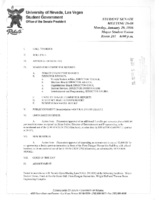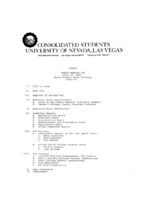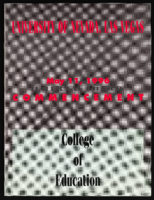Search the Special Collections and Archives Portal
Search Results

Meeting minutes for Consolidated Student Senate University of Nevada, Las Vegas, January 29, 1996
Date
Archival Collection
Description
Text

Meeting minutes for Consolidated Student Senate University of Nevada, Las Vegas, March 13, 1986
Date
Archival Collection
Description
Text

Meeting minutes for Consolidated Student Senate, University of Nevada, Las Vegas, April 29, 1980
Date
Archival Collection
Description
Text

Meeting minutes for Consolidated Student Senate, University of Nevada, Las Vegas, June 01, 1982
Date
Archival Collection
Description
Text

University of Nevada, Las Vegas (UNLV) College of Education 33rd commencement program
Date
Archival Collection
Description
Commencement program from University of Nevada, Las Vegas Commencement Programs and Graduation Lists (UA-00115).
Text

Transcript of interview with Stella Champo Iaconis by Kay Long, May 14, 1997 & September 1997
Date
Archival Collection
Description
The Champo family, Jacinta and Manuel Champo and their daughter Stella came from Italy to Las Vegas in 1912. They lived in a room at the Union Hotel, which was located at Main and Bridger. In 1917, the Champo family bought a small ranch located about three miles south of what is Henderson today. Manuel grew fruits and vegetables at the ranch and sold them in town door to door. Stella began her education at Las Vegas Grammar School at Fourth and Bridger in 1918 and started babysitting for many of the local women when she was only ten years old. Jacinta’s death in 1927 was hard on both Stella and Manuel. Stella decided not to finish her education. Maude Frazier, who was the principal at the High School, tried to persuade Stella to stay at school. However, Stella had no more interest in school and at eighteen years old she started her career as a waitress. Her first job was at a small Italian restaurant at the Union Hotel where she learned the business. She worked as a waitress and cashier and when P.O. Silvagni opened the Apache Hotel at Second and Fremont she went to work there. Stella continued to work at the Apache until she moved to Los Angeles where she worked as a waitress for eighteen years. Stella had married John Iaconis in 1953 and they moved back to Las Vegas. Both John and Stella went to work at the Sahara Hotel. Stella was a showroom waitress and John was a tailor with his own valet shop in the Sahara Hotel. Stella worked in a showroom at Sahara for three years because it was physically demanding work. Stella went to work at Larry’s where she stayed for twenty years. Stella continued to live in Las Vegas until her death on January 18, 1998 . She was happily retired and always remembered the past and the lessons she learned from her hard work. Stella was a very optimistic and totally self-reliant woman.
Text

Steve Jones and Bart Jones interview, Novermber 7, 2016: transcript
Date
Archival Collection
Description
Brothers Steve and Bart Jones live and breathe Las Vegas history. Their grandparents, Burley and Arlie Jones, arrived in Las Vegas in the nineteen-teens; their father, Herb Jones; his sister, Florence Lee Jones Cahlan, and their uncle, Cliff Jones, helped form the legal, journalistic, and water policy framework that sustains Southern Nevada today. The Jones brothers build on that foundation through their custom home-building company, Merlin Construction. In this interview, they talk about living and growing up in Las Vegas, of attending John S. Park Elementary School, of hunting in the desert, of their family's commitment to cultural and racial diversity, and of accompanying their grandfather to his business at the Ranch Market in the Westside. They share their early work experiences lifeguarding and later, dealing, at local casinos as well as second-hand memories of the Kefauver trials through the tales told by their father and uncle. Steve describes mentor Audie Coker; he explains
Text

Transcript of interview with Christie Young by Dennis McBride, October 18, 1998
Date
Archival Collection
Description
I've known Christie Young for many years and was grateful she agreed to be interviewed for the Las Vegas Gay Archives Oral History Project. Not only is she frank in what she says, but her background as a researcher in sexual issues and as a straight woman involved in the gay community give her a unique perspective. Ancillary to her donation of this interview transcript to the University of Nevada, Las Vegas, Christie has generously donated her personal journals which detail more than a decade of her life including the years she worked with Las Vegas's gay community . Christie shares the project's concern that documentation of the gay community is ephemeral and vanishes rapidly; her determination that her contribution to that community be preserved greatly enriches our knowledge and will benefit future scholars.
Text

Leonard M. Jessup interview, August 6, 2018: transcript
Date
Description
“I decided to just keep going, and I devoted my career to higher ed. I wanted to continue putting back into this system that I felt I got a lot out of. Again, repaying a debt.” What began as a passion for playing school sports would later lead Dr. Len Jessup on a path to lifelong service in the area of higher education. From his California childhood he would soon find himself across different U.S. states performing various higher education duties from professor to university president. In this interview, Jessup talks about his grandparents’ decision to emigrate from Italy to the U.S. and how grateful he feels towards his family as a result. He recalls playing baseball in college. In his eyes, being part of several sports teams helped him develop into the person he is now. He describes doing research during at the University of Arizona and speaks to what it was like moving from one university position to the next. Ultimately, his colleagues would recommend that he move to Las Vegas to
Text

Transcript of interview with Nora Luna by Maribel Estrada Calderón, November 7, 2018
Date
Archival Collection
Description
Nora Luna (1971 - ), the daughter of Mexican immigrants, recalls her growing up experience in the Las Vegas Valley. During her childhood, she and her siblings frequently persuaded their father to take them out to eat to the Circus Circus buffet. She enjoyed playing the carnival games at the Circus Circus. She attended Las Vegas High School. In 1994, she graduated from UNLV with a degree in criminal justice. Her education inspired her to work with the community’s youth. She tutored children at the Y.M.C.A. of Southern Nevada. Luna also worked for a program, Anahuac, which sought to deconstruct some of the myths that often prevent Latinos from attending college. In Reno, Nevada she worked with non-profit organizations to implement evidence-based practices for youth development. Luna has worked for Nathan Adelson Hospice as the Director of Diversity and Grant Funding since 2008. She seeks to find culturally competent care for Latinos and ensures that the hospice provides informational r
Text
